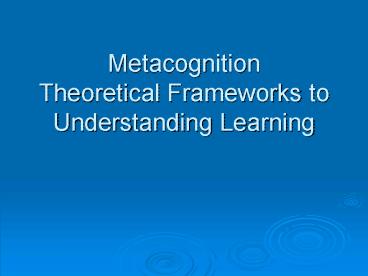Metacognition Theoretical Frameworks to Understanding Learning PowerPoint PPT Presentation
1 / 21
Title: Metacognition Theoretical Frameworks to Understanding Learning
1
MetacognitionTheoretical Frameworks to
Understanding Learning
2
Metacognition
- Metacognition refers to a learners ability to be
aware of and monitor their own learning
processes. - Usually defined by its component parts.
3
Two Components Schraw, 1998
- Knowledge of cognition
- Refers to what individuals know about their own
cognition or cognition in general.
- Regulation of cognition
- Refers to metacognitive activities that help
control ones thinking and learning.
4
Knowledge of Cognition
- Includes three types of metacognitive awareness
- Declarative Knowledge
- Procedural Knowledge
- Conditional Knowledge
5
Knowledge of Cognition
Procedural
Conditional
Declarative
- knowing about oneself as a learner and about what
factors influence ones performance. - Example capacity limitations, rehearsal, and
integration of info into LTM. - Effective learners appear to use these aspects.
- Refers to knowing when and why to apply various
cognitive actions. - Example knowing when and what information to
rehearse. - Allows students to allocate resources and use
strategies effectively.
- Refers to knowledge how to execute procedural
skills. - Example heuristics and strategies such as how
to chunk information. - Individuals use knowledge and select skills more
automatically.
6
Regulation of Cognition
- Three essential skills are included in the
process of controlling ones thinking or
learning - Planning
- Monitoring
- Evaluation
7
Regulation of Cognition
Monitoring Refers to ones on-line awareness of
comprehension and task performance. Example
Such as self-testing while learning.
Evaluation Refers to appraising the products and
regulatory processes of learning. Example Such
as re-evaluating goals and conclusions.
Planning Selection of appropriate
strategies and the allocation of
resources that effect performance.
Example making predictions before
reading, selection of strategies and
allocation of resources before beginning a task.
8
Metacognitive Theories
- Is a relatively systematic structure of
knowledge that can be used to explain and predict
a broad range of cognitive and metacognitive
phenomena (Schraw Moshman, 1995.) - These theories are personally derived.
- And integrate knowledge of cognition and
regulation of cognition.
9
Metacognitive Theories
- Characteristics
- Allows an individual to integrate varied aspects
of metacognition into a single framework. - For example, children have difficulty using
knowledge of memory to regulate cognition,
because they have not yet integrated
metacognitive knowledge and regulatory skills.
10
Metacognitive Theories
- Characteristics continued
- Coordinate beliefs that allow individuals to
predict, control and explain their cognition, the
cognition of others, or cognition in general. - For example, a good strategy user, knows
effective learning depends on activating relevant
knowledge from memory, selectively using
strategies, and motivates oneself to learn
material at a deeper level. This guides ands
coordinates ones learning constituting a theory
of what it means to be an effective learner.
11
Metacognitive Theories
- There are three different types of metacognitive
theories - Tacit Theories
- Informal Theories
- Formal Theories
12
Tacit Theories
- Are unconcious frameworks that systematize
metacognitive knowledge. - for example, childrens beliefs about
intelligence affects behavior in a classroom.
13
Informal Theories
- Individuals are aware of some of their beliefs
and assumptions regarding a phenomena, but have
not yet constructed a theoretical structure that
integrates and justifies beliefs. - Informal theories start as domain specific, and
gradually are generalized to other domains.
14
Formal Theories
- A systemized approach to learn something that
has a specific form or structure (e g. physics,
music, or statistics) that needs to be known,
used, or remembered. - Allows individuals to make informed choices about
self-regulatory behaviors.
15
Sources of Metacognitive Theories
16
Implications for Educators
- When students lack a theory of metacognitive
knowledge, they are unable to explain their
cognitive performance or plan effectively. - For example, students have difficulty in
scientific reasoning due to lack of knowledge of
a theory of metacognition. - Students do not differentiate between formal
hypotheses and the data used to test these
hypothesis, because they lack the skills to think
strategically.
17
Implications for Educators
- Many programs do not help students understand the
structure of metacognitive theory and use the
theory to organize knowledge.
18
Implications for Educators
- Thus, Instructional programs should include
- Ways to help construct metacognitive awareness
aiding theoretical formalization. - To accomplish this
19
Implications for Educators
- Educators need to promote general awareness of
the importance of metacognition - Improve regulation of cognition.
- And foster environments promoting metacognitive
awareness.
20
Improving regulation of CognitionRegulatory
Checklist (Schraw, 1998)
Planning
Monitoring
Evaluating
- Do I have a clear
- understanding ?
- Am I reaching my
- goals?
- Do I need to make
- changes?
- Have I reached my goals?
- What worked?
- What didnt work?
- What would I do differently next time?
- What is the nature of
- the task?
- What is my goal?
- What kind of
- information and
- strategies do I need?
- How much time will I
- need?
21
Fostering Environments Promoting Metacognitive
Awareness
- Promoting goal orientations in the classroom Vs.
performance orientations. - Students with mastery orientations seek to
improve their competence, whereas, students with
a performance orientation seek to prove
competence.

